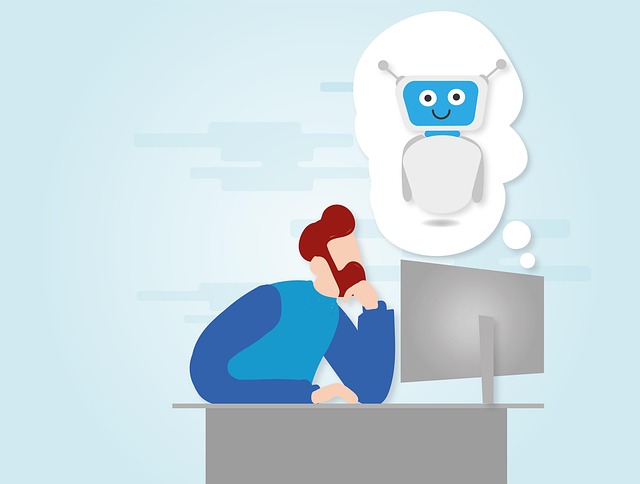AI chatbots, leveraging NLP and machine learning algorithms, offer versatile, human-like interactions across diverse platforms. They enhance user experiences through contextually relevant responses, continuous learning, and pre-written scripts. In various sectors like e-commerce, banking, healthcare, and education, these chatbots revolutionize customer service, improving satisfaction and efficiency. However, balancing complexity with accuracy remains a challenge, but advancements in AI technology are expected to overcome these hurdles, leading to more sophisticated chatbot interactions.
“Unveiling the power of AI chatbots: A Comprehensive Guide
In today’s digital landscape, AI chatbots are transforming the way businesses interact with customers. This article provides a detailed exploration of these sophisticated tools, starting with a basic understanding of AI chatbots and their fundamental role in automation. We’ll delve into the inner workings of scripted chatbots, highlighting how they process user inputs and generate responses.
Read on to discover the myriad benefits of implementing this technology, explore its common applications across industries, and gain insights into the challenges and future prospects shaping the chatbot revolution.”
- Understanding AI Chatbots: A Basic Overview
- How Do Scripted Chatbots Work?
- Benefits of Using Scripted Chatbot Technology
- Common Applications of Scripted AI Chatbots
- Challenges and Future Prospects
Understanding AI Chatbots: A Basic Overview
AI chatbots are a type of virtual assistant powered by artificial intelligence and natural language processing (NLP) technologies. They can understand, interpret, and respond to human language inputs, enabling meaningful conversations in various contexts. These chatbots are designed to mimic human-like interactions, making them versatile tools for customer service, education, entertainment, and more.
At their core, AI chatbots operate based on algorithms that analyze vast amounts of data to learn patterns and generate contextually appropriate responses. Whether it’s answering queries, providing recommendations, or offering personalized assistance, these chatbots are constantly evolving. Advanced machine learning techniques allow them to adapt to new information, improve accuracy over time, and deliver more human-like experiences, enhancing user engagement and satisfaction across different platforms.
How Do Scripted Chatbots Work?
Scripted chatbots operate by using pre-written responses and logical branching to simulate a conversation with a human user. At their core, they rely on artificial intelligence (AI) algorithms that analyze user input and match it to relevant responses from a vast database. This process involves several steps: first, the chatbot processes the user’s message, identifying keywords and intent. Then, using natural language processing (NLP), it interprets the meaning behind the words and contextual cues. Based on this analysis, the AI selects an appropriate response from its script.
The scripts themselves are meticulously designed to cover a wide range of potential user queries and scenarios. Developers create these by envisioning common user interactions and crafting responses that address each scenario. More advanced chatbots can even learn from past conversations, improving their accuracy and adaptability over time. This dynamic interaction between AI algorithms, pre-written scripts, and real-time analysis ensures that scripted chatbots provide coherent, contextually relevant, and engaging interactions with users.
Benefits of Using Scripted Chatbot Technology
Scripted chatbot technology offers numerous advantages in today’s digital landscape. One of the key benefits is enhanced customer experience; these AI chatbots can handle a wide range of customer inquiries efficiently, providing quick responses and 24/7 availability. This not only improves customer satisfaction but also reduces response times, allowing businesses to manage high volumes of interactions effectively.
Additionally, scripted chatbots ensure consistent communication. They adhere to pre-defined scripts, ensuring every customer interacts with the bot according to set protocols. This consistency is particularly valuable for maintaining brand voice and tone across all touchpoints, fostering a professional and unified user experience.
Common Applications of Scripted AI Chatbots
AI chatbots have found their way into various sectors, revolutionizing customer service and support. One of the most common applications is in e-commerce, where they assist customers with product recommendations, answer queries about inventory, and provide post-purchase assistance, enhancing the overall shopping experience. These chatbots can also be utilized in banking and finance to offer personalized financial advice, help with account management, and even facilitate basic money transfers, making financial services more accessible and efficient.
Another popular use case is in healthcare, where AI chatbots can act as virtual assistants, scheduling appointments, providing initial patient assessments, and offering health-related information, thereby reducing the workload on medical professionals and improving patient care accessibility. Additionally, these chatbots are employed in education to deliver personalized learning experiences, answer student queries, and provide study resources, making education more interactive and convenient.
Challenges and Future Prospects
Despite their remarkable capabilities, AI chatbots like scripted chatbots face several challenges that must be addressed for widespread adoption. One significant challenge is the balance between conversational flow and factual accuracy. As chatbots engage in more complex interactions, maintaining coherent and contextually appropriate responses while adhering to vast knowledge bases becomes increasingly difficult.
Looking ahead, the future of AI chatbots holds immense promise. Advancements in natural language processing, machine learning, and access to diverse datasets will enhance their understanding of nuances, idiomatic expressions, and cultural contexts. This evolution will enable more sophisticated scripted chatbots to handle intricate user queries, fostering richer and more human-like conversations. The potential for integration across industries—from customer service and healthcare to education and entertainment—is vast, promising to transform how we interact with technology.
AI chatbots have transformed the way businesses interact with customers, offering numerous benefits such as 24/7 availability, cost-effectiveness, and scalable support. Scripted chatbots, in particular, streamline these interactions by leveraging pre-defined scripts and conversational flows. As technology advances, we can expect AI chatbots to become even more sophisticated, addressing current challenges like context understanding and emotional intelligence. Their versatility across various sectors from customer service to healthcare signifies a promising future where AI-driven conversations enhance our daily experiences.
